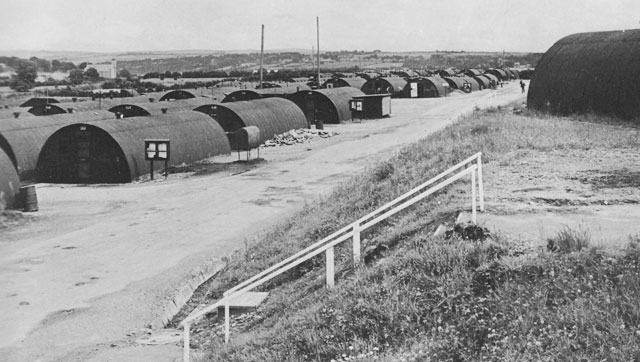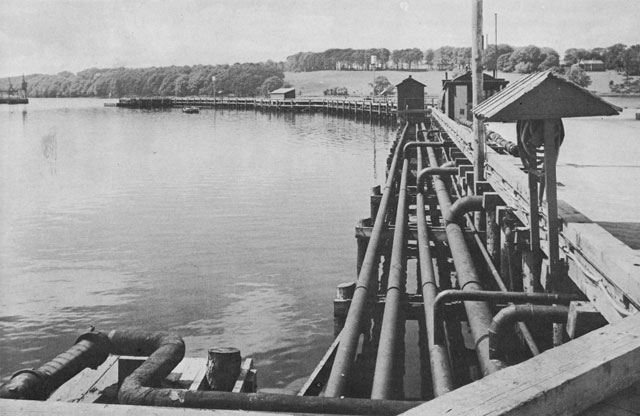
Dennis Kolodziej (pictured in his Navy days) co-founded US NAVCOMMSTA Derry Alumni Association
United States Navy veterans who were based in the Navy’s Derry bases are back in town for a reunion, 46 years after the final base was decommissioned.
The Naval Communication Station (NAVCOMMSTA) Derry Alumni Association is holding a gala dinner on Thursday, August 3 in the City Hotel.
The Alumni Association has returned to the city every four years since 2003. It was founded to reunite sailors who served at the Station in Derry from 1942 through 1977 with civilians and their families.
It was founded after two women from Derry reached out to Dennis Kolodziej in hopes he could reconnect one of them with a Navy sailor she had a relationship with some 20 years prior.
Dennis served in Derry in the mid-seventies and says returning is like rolling back the years.
“I always tell my wife I like coming back here because I'm reliving my youth. I come back here and feel like I'm 21 years old. I want to go running around and staying out late and things of that nature,” he said.
“I got stationed here in November 1974 and I was here through May of '77. I was an Electronics Technician.”
Dennis worked at the communication station as an Electronics Technician.
“It was a relay station where they would take messages that came either by Morse code or by teletype and what we would do is just basically retransmit them to various ships and whatnot that were out in the North Atlantic, and then also to receive messages and send them back to back to the United States, you know, for whatever reasons.
“It could have been anything, tactical information or supplies or whatever, you know, things of that nature.”
Denis says the reunions have become smaller affairs since the original event in the early 2000s.
“Our first reunion in 2003, at our grand gala we had probably over 500 people attend. Now it has been close to 50 years since the base closed and we're all getting old. Our group now is almost all, you know, seventy years old and older.
“Our people are no longer with us or their health limits their travel and our group is shrinking. That's just part of life, you know. I don't know what it's gonna be like four years from now.”
The US Naval Operating Base in Derry became a centre of military activity at the beginning of World War II.
_enjoying_a_meal_on_his_return_to_Derry-1691057931174.jpg)
Dennis (far left) enjoying a meal on his return to Derry
Allied communications centred around a radio facility in the base. In 1943 the US Navy was granted use of the land upon which the Clooney and Rossdowney compounds were later based.
Later, the US Naval Radio Station was established as a separate activity from the base. This ultimately became NAVCOMMSTA Derry. A month after it was established, the original Naval Operating Base was decommissioned.
NAVCOMMSTA Derry was disestablished in 1977, ending a 35-year history of US Naval communications in Derry. At the time of its closing, it was the oldest US naval facility in Europe.
“Derry, for the United States, for these convoys, it was a large area, I think there were over 5900 US Sailors and Marines that were stationed in the area. There were Canadians and British stationed here and whatnot,” Dennis said.
“There was a large concentration of troops who were in the Derry area and wider Northern Ireland too because there were a lot of US Army and Army Air Force that were there too. As you go around there are all sorts of airfields and camps and things like that here in the North.”
Dennis was the third person in his family to be stationed in Derry. His uncle and his cousin's grandfather both served during World War II.
“My uncle Mike was here in 1944. He was out at Springtown and when the fighting went to France he left, I think it was around June of '44. He was actually an Infantry [foot soldier] and he was severely wounded in France and was in hospital there, I think, til' May of '44.
“And then because my family was German and Polish they spoke English, German and Polish so in the end he was an interpreter assigned at a concentration camp for people in the camp so they could communicate.”
Dennis says Mike didn't like to speak about the war, to such an extent that Dennis didn't even know he was stationed in Derry until years after he had returned himself.
“I was at my cousin's wedding and we were talking about his time in Europe and he mentioned he was in Northern Ireland. I said 'well, where?' and he said 'it was way, way far in the western part of Northern Ireland' and he was thinking and he said 'Londonderry' and I said 'that's where I was at.'”
His cousin's grandfather was a Seabee. This unit was formed during the war and gets its name from the first letters of the words 'Construction Battalion', which is a battalion tasked with construction for military use.
“He was here at Beech Hill from 1943 to '44. There was a big down phase in the middle of '44 once the Allies went into France and the base here in Derry wasn't that important any more.
“He left and went to the Pacific Theatre for the rest of the war and later came back here to get his Derry bride and brought her back to the States to Saint Paul, Minnisota and then they lived in Minnesota for the rest of their lives.
“Back in World War II, to bring a bride back from Ireland wasn't as common. When I was here, probably about a third of the guys ended up marrying local girls.”

General View of Living Quarters at Springtown Base, 1944
In addition to coming back for the reunions, while working for Ford Motor Company, Dennis scheduled a visit to Derry every time he travelled to Europe for business. He has been amazed by the changes in the city over the years.
“I was here during the troubles so you had the army here and checkpoints everywhere. You had ramps at night, you did not drive around with your headlights on because of the army foot patrols.
“We still had a good time although it wasn't the best time here for the people but since coming back the town is so open – it's unbelievable. The amount of cars that are here, the tourist industry, all the different restaurants and pubs and things to do. It's turned into a very large tourist attraction with the walls and all the different cathedrals and churches here and the Guildhall.
“We've seen all the different upgrades to the town. The peace bridge, I've walked across that, you go over by Ebrington Barracks and what was the old army base is all opened up and they do concerts and things of that nature.”
He says many of the old buildings he would have recognised have been knocked down and Foyle Street in particular 'doesn't look anything like it did 40/50 years ago'.
Despite being in Derry at the height of the Troubles, Dennis says he never had any issues and believes the Navy sailors were 'an accepted part of the community'.
“I think the fact there was so much interaction between the Americans and marrying local Irish girls, and so many people come back now to see their relatives, that's just a testimony to that.
“I never had any problems over here. We'd go into pubs or somewhere and it was great, always a positive experience.”
Dennis met his now wife in Derry but lost touch when he moved away when the base was closed. They reconnected years later and have been together since.
“There were a number of people who had romances when they were stationed here 30/40 years ago and there were some who got together and got married. There were cases where their first spouse passed away and their romance rekindled.”
The NAVCOMMSTA Derry Alumni Association has over 700 members and Dennis says almost every sailor he has spoken to loved their time here.
“Most people just hated to leave here. They love this place so much. You know, Derry was always truly, truly very special. It was a special place,” he said.

Subscribe or register today to discover more from DonegalLive.ie
Buy the e-paper of the Donegal Democrat, Donegal People's Press, Donegal Post and Inish Times here for instant access to Donegal's premier news titles.
Keep up with the latest news from Donegal with our daily newsletter featuring the most important stories of the day delivered to your inbox every evening at 5pm.